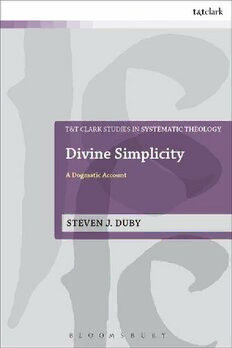Table Of ContentT&T Clark Studies in
Systematic Theology
Edited by
John Webster
Ian A. McFarland
Ivor Davidson
Volume 30
Divine Simplicity
A Dogmatic Account
Steven J. Duby
Bloomsbury T&T Clark
An imprint of Bloomsbury Publishing Plc
Bloomsbury T&T Clark
An imprint of Bloomsbury Publishing Plc
Imprint previously known as T&T Clark
50 Bedford Square 1385 Broadway
London New York
WC1B 3DP NY 10018
UK USA
www.bloomsbury.com
BLOOMSBURY, T&T CLARK and the Diana logo are trademarks of Bloomsbury
Publishing Plc
First published 2016
© Steven J. Duby, 2016
Steven J. Duby has asserted his right under the Copyright, Designs and Patents Act, 1988,
to be identified as Author of this work.
All rights reserved. No part of this publication may be reproduced or transmitted in any
form or by any means, electronic or mechanical, including photocopying, recording, or
any information storage or retrieval system, without prior permission in writing from the
publishers.
No responsibility for loss caused to any individual or organization acting on or refraining
from action as a result of the material in this publication can be accepted by Bloomsbury or
the author.
British Library Cataloguing-in-Publication Data
A catalogue record for this book is available from the British Library.
ISBN: HB: 978-0-56766-567-6
ePDF: 978-0-56766-569-0
ePub: 978-0-56766-568-3
Library of Congress Cataloging-in-Publication Data
Duby, Steven J.
Divine simplicity : a dogmatic account / by Steven J. Duby.
pages cm
ISBN 978-0-567-66567-6 (hardback)
1. God (Christianity)--Simplicity. I. Title.
BT148.D83 2015
231’.4--dc23
2015024318
Typeset by Fakenham Prepress Solutions, Fakenham, Norfolk NR21 8NN
For Jodi
Contents
Acknowledgements ix
Abbreviations x
Introduction 1
1 Some Historical Bearings 7
I. Patristic affirmations 7
II. Medieval developments 11
III. Protestant reaffirmations 18
IV. Modern criticisms and revisions 25
V. Recent discussions 34
a. Theological misgivings 34
b. Analytic criticisms and defences 42
VI. Conclusion 53
2 Contours of a Dogmatic Approach 55
I. Exegesis, dogmatics and metaphysics 55
II. Dogmatics and analytic philosophy 67
III. A cartography of divine simplicity 80
3 An Exegetical–Dogmatic Case for Divine Simplicity (Part One) 91
I. ‘The Lord our God, the Lord is one’: Divine singularity and divine
simplicity 91
a. Biblical teaching 91
b. Toward simplicity 100
c. Conclusion 108
II. ‘Life in himself’: Divine aseity and divine simplicity 109
a. Biblical teaching 109
b. Toward simplicity 118
c. Conclusion 131
viii Contents
4 An Exegetical-Dogmatic Case for Divine Simplicity (Part Two) 133
I ‘No change or shadow of turning’: Divine immutability and divine
simplicity 133
a. Biblical teaching 133
b. Toward simplicity 143
c. Conclusion 149
II. ‘His greatness is unsearchable’: Divine infinity and divine simplicity 150
a. Biblical teaching 150
b. Toward simplicity 155
c. Conclusion 159
III. ‘In the beginning, God created’: Creatio ex nihilo and divine simplicity 160
a. Biblical teaching 160
b. Toward simplicity 167
c. Conclusion 175
5 Objections to Divine Simplicity 179
I. Divine simplicity and the plurality of the attributes 179
a. Barth, Pannenberg, and the spectre of subjectivism 179
b. The analytic quest for logical coherence 186
II. Divine simplicity and divine freedom 193
a. Recent proposals 193
b. Parsing the divine decree 196
c. The active power of God 201
d. Accidents, relative attributes, and the relatio mixta 202
III. Divine simplicity and the Trinity 207
a. Tensions in recent analyses 207
b. Biblical exegesis and the personhood of the persons 212
c. Problems with tripling personal faculties 219
d. The modal and real relative distinctions 226
IV. Conclusion 234
Conclusion 235
Bibliography 239
Index 255
Acknowledgements
This book began as a PhD thesis at the University of St. Andrews, and I
would first like to thank my Doktorvater, Ivor Davidson, for his wisdom and
encouragement throughout the process of writing and preparing the work for
publication. Under the providence of God I was given a theological mentor
whose insights and sense of how theology should be done have proven
instructive time and again. I am grateful to John Webster and Paul Nimmo
also for giving helpful and gracious feedback on reading the material. I also
need to thank those mentors whose influence and ongoing encouragement
in the study of theology stretch back to my days as a seminary student –
especially Dave Buschart, Don Payne, Craig Blomberg and Bill Klein. To my
first teacher in the faith, Mike Garner, I am always indebted in all my reflection
on God and his revelation in Scripture. For their camaraderie and hospitality
the past few years at St Andrews and beyond, I am grateful to Andrew Hay,
Travis Buchanan and their families. To my parents I am grateful for making
countless sacrifices in supporting my pursuit of a calling that aligns with
my interests and is energizing to me. Above all, I say thank you to my wife,
Jodi, for her unfailing love and support in the midst of an incredibly busy
life. Her companionship is an anchor and a rich blessing that words can only
inadequately express. Throughout the time of writing this book, our children,
Charlie and Evangeline, have been a constant source of joy and needed breaks
from academic work, and I am grateful to them as well.

